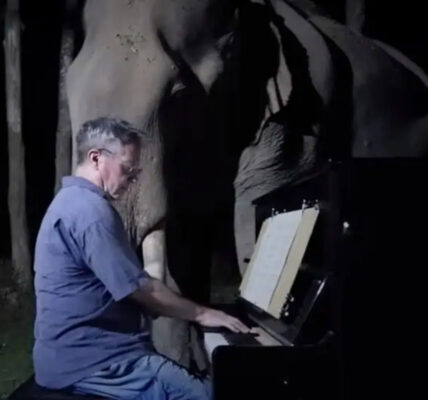The forest that morning was quiet in a way that felt almost sacred — the kind of silence that comes not from emptiness but from life holding its breath. Sunlight filtered through the canopy in golden ribbons, dust motes drifting like tiny fireflies. Birds called from deep in the foliage. Leaves trembled under the slightest breeze.
And somewhere in that vast, living cathedral stood a woman with a handful of bananas and a phone camera pointed straight at her.

She wasn’t cruel. She wasn’t foolish in the malicious sense. Like so many people, she had grown up seeing elephants in cartoons, movies, and viral videos — gentle giants, slow and sweet, their trunks swaying like pendulums made of kindness.
She wanted a moment. A photo. A laugh.
She didn’t understand the language of the forest.
Not yet.
The video begins with her standing in the bushes, holding out a single banana. Her friend behind the camera can be heard giggling, encouraging her. There is no fear in their voices. Only amusement.
Just a few feet away, partially hidden in the brush, stood the elephant.
A tusker — adult, strong, heavy with the quiet dignity of a wild creature that has lived through storms, hunger, danger, and more than a few encounters with humans. His ears flapped gently. His eyes followed the banana. His trunk lifted, hopeful, reaching.

He stepped forward for a bite.
She yanked the banana back, laughing.
Her friend laughed too.
The elephant blinked, momentarily confused.
He lifted his trunk again.
Once more, she extended the banana.
Once more, she pulled it away at the last second.
To her, it was a harmless tease. A joke. Something to share online.
To him, it was something else.
Animals do not understand mockery.
But they understand hunger.
They understand disrespect.
They understand a promise broken.
The elephant shifted his weight, stepping out of the bushes fully now. Sunlight lit his wrinkled skin. His tusks gleamed. His trunk curled toward her, not aggressively but firmly — asking, insisting.

Behind the camera, the second woman called out cheerfully, “Hi, elephant!”
As if greeting a neighbor.
As if greeting someone incapable of anger.
The elephant stopped.
And in that pause, something ancient flickered inside him.
Elephants are emotional beings — grieving, loyal, intelligent, deeply aware. They mourn their dead. They remember kindness. They also remember threats.
In that moment, the tusker seemed to understand something essential:
These women weren’t offering food.
They were toying with him.
Everything changed in an instant.
The video shows the shift — from patience to frustration, from silent tolerance to self-defense. His trunk swung upward in one swift, powerful arc, connecting with the woman’s shoulder.
She flew backward — not violently enough to maim, but forcefully enough to deliver a lesson older than language, older than humanity itself.
A lesson the forest had been trying to teach since the beginning:
Wild animals deserve respect.
And mocking them is a dangerous path.
The camera shook.
The women screamed.
Bananas scattered across the dirt like fallen offerings.
Then the elephant did something remarkable — something that proved his nature was still gentler than humans assumed.
He stepped back.
He did not charge.
He did not trample.
He did not continue the attack.
Because elephants do not hurt for pleasure.
They hurt only when forced to defend their dignity, their boundaries, or their young.
The woman scrambled away, shaken, shocked into silence. Her friend dropped the camera. The forest fell quiet once again, as if holding its breath.
As if waiting to see if the lesson had been learned.
THE AFTERMATH
When the video was uploaded, it didn’t take long for it to explode across the internet. Within hours, it had been viewed hundreds of thousands of times. People laughed at first — the way humans often do when confronted with something startling.
But the laughter faded quickly.
Comments poured in — hundreds, then thousands — from people who understood the deeper truth behind the images.
“Never tease a wild animal.”
“She’s lucky it wasn’t worse.”
“That elephant showed more restraint than most humans ever would.”
“We should respect their space.”
“This is why wildlife education matters.”
IFS Officer Susanta Nanda, who shared the video originally, offered it not as entertainment but as a warning — a reminder that wild animals are not props for selfies or tools for amusement.
And among the voices online, a solemn truth began to emerge:
Humans forget how powerful animals are because animals are too patient with us.

Patience that humans often mistake for weakness.
Gentleness humans often mistake for safety.
Tolerance humans often mistake for permission.
But the wild has limits.
And that day, one woman found the edge of it.
THE ELEPHANT’S STORY
What most people never consider is the elephant’s side of the story.
He had likely approached with hope — expecting food, expecting kindness. Elephants often wander near human settlements, searching for fruit, salt, or water. They know humans can offer food. They also know humans can be dangerous.
Yet he chose trust.
And in return, he was teased.
For a moment, his hunger, his dignity, his instinct collided. He reacted not out of rage but out of clarity — a single movement meant to say:
“Enough.”
Then he walked away.
If he had wanted to harm her, he would have.
If he had wanted revenge, she would not have stood back up.
But elephants rarely choose violence.
Humans force it into their hands.
THE LESSON
We often take from nature without asking.
We film it, feed it, mock it, corner it, chase it — forgetting that these creatures do not exist for our entertainment.
Respect isn’t optional in the wild.
It’s survival.
For them, and for us.
The woman learned this.
The forest taught her.
The elephant delivered the message.
And perhaps the most emotional part of the story isn’t the moment she fell — but the moment the elephant chose to walk away.
Because even after being teased, even after being disrespected, he chose mercy over retaliation.
A reminder that:
Humans may have intelligence, but animals often have the deeper wisdom.
A wisdom shaped by centuries of surviving with grace.
A wisdom we must learn to honor.




